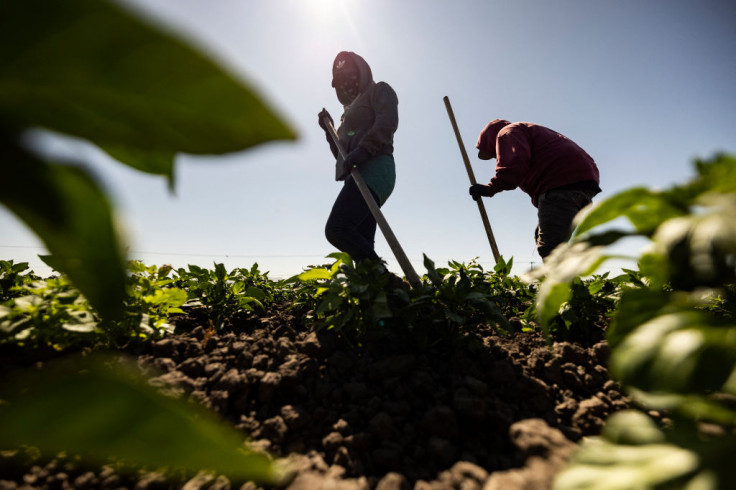
As the Trump administration ramps up its deportation operations, workers across the agricultural sector throughout the country are experiencing more raids from Immigration and Customs Services (ICE), as well as increased difficulty to find jobs.
Almost half of farm workers in the U.S. (42%) were born in a foreign country and don't have legal status, while only 19% are migrants with temporary visas or permanent residency, according to USDA.
The possibility of mass deportations in that sector, and its vast repercussions on the food that reaches Americans' table, has been recognized by the administration, with President Trump suggesting at a recent Cabinet meeting that undocumented people working on farms and in hotels would be allowed to leave the country and return as legal workers if their employer vouched for them.
But there have been no concrete developments in that area, and ICE and Customs and Border Protection (CBP) have continued targeting farm workers. In the last months, pictures and videos have been shared on social media that show empty farms with food that has not been collected due to a lack of workers.
Furthermore, on several farms, "they don't plant the same things anymore. There are several people just like me who aren't working, who haven't worked in a while," Gricelda, a farmworker, told Noticias Telemundo. She has been working in the farming industry for three years since she arrived in the U.S. from El Salvador, harvesting and packing fruits and vegetables, a job that she says she "loves." "Or at least that's what I'm used to," she adds.
But since Trump took office, despite her willingness to work, she points out that finding opportunities has been increasingly difficult.
"It's very difficult," lamented the woman, who has three children and asked not to use her last name for fear of losing job opportunities. Griselda asserts that she is a permanent resident, but that for "people who don't have a permit or anything, it must be more difficult."
Experts say the lack of work, and fear from farm workers to show up in farms, coupled with the administration's sweeping tariffs, could have a significant impact on the availability of food.
"The American consumer has a habit of eating whatever they want whenever they want, regardless of the season and without considering that the sources of their food are people," said Ernesto Ruiz, senior researcher at the Farmworker Association of Florida.
"And we can enjoy this in part because we import a tremendous amount of food. This is going to be complicated for the consumer now," he notes. Consequently, he says, "we need local production now more than ever."
American farmers have also been raising alarms about the effect of Trump's different policies on the industry. In March, business owners and leaders rallied in Washington and met with members of Congress as part of the American Business Immigration Coalition's "Secure the Workforce" campaign, aimed at continuing the flow of immigrant workers to the United States. The group is pushing for legislation that includes, among other things, work permits for immigrant workers.
But despite the warning from experts and workers, the Trump administration is continuing with their mass deportation plans. In response to an NBC News request for more details, White House spokesman Kush Desai said the Trump administration "is committed to delivering on the mandate that the American people gave to President Trump with a whole-of-government approach to secure our borders, enforce our immigration laws, mass deport criminal illegal migrants, and put America first.
© 2025 Latin Times. All rights reserved. Do not reproduce without permission.




